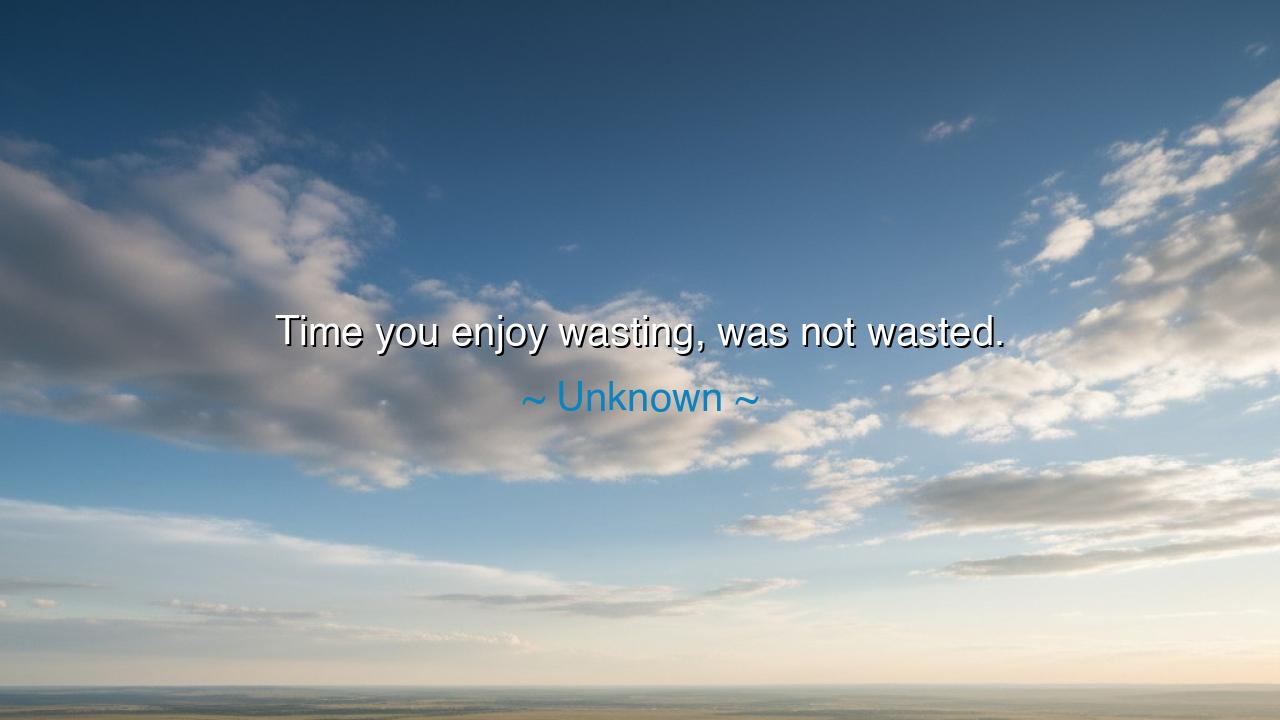
Time you enjoy wasting, was not wasted.






Hear the serene and liberating words often attributed to the sages of old: “Time you enjoy wasting, was not wasted.” Though its origin remains uncertain, its wisdom is eternal. For men and women of every age have wrestled with the measure of time, fearing its loss, striving to prove its use, yet forgetting that the worth of time is not always counted in deeds accomplished or monuments raised, but also in the joy of the heart, the laughter of the moment, the peace of being.
The ancients themselves debated the nature of time. The Stoics taught discipline, urging men to guard their hours as treasure. Yet even they admitted that life without joy is a hollow conquest. This quote harmonizes with such wisdom: time well-spent is not only measured by productivity, but by delight. When one gives himself to rest, to leisure, to playful wandering, he is not squandering the gift of life but honoring it, tasting the sweetness of existence.
Consider the tale of Winston Churchill, whose burdens of war demanded unbroken vigilance. Yet amidst the thunder of battle and the pressure of command, he devoted hours to painting. Many mocked this “waste” of time, yet Churchill himself declared it preserved his sanity, refreshed his spirit, and gave him strength to lead. The world may have seen only idle brushstrokes, but through them he found renewal. Here lies the proof: time enjoyed, no matter how the world judges it, is never wasted.
Too often mankind binds itself with chains of false urgency. We measure worth by labor, wealth, and reputation, and we call leisure “idleness” or “waste.” But the soul longs for more than endless toil. To sit beneath a tree and watch clouds drift, to listen to the laughter of children, to play a game, to share a quiet meal—these are not losses but riches. For in such moments, the heart remembers it is alive, and the spirit drinks deeply from the well of joy.
The wisdom of this quote is also a warning: that to deny ourselves pleasure, laughter, and rest is to waste life in another way. The man who works without pause, who spends his days chasing crowns and coins, may arrive at the end of life rich in possessions but poor in joy. The woman who fears wasting time may find that she has wasted life itself, for she never allowed her heart to be free. True waste is not in enjoyment, but in joyless striving.
The lesson is clear: do not measure your life only by achievements that others applaud. Measure also by the quiet hours that nourished your soul, the laughter that healed your wounds, the moments you “wasted” in happiness. If you enjoyed them, they were sacred. If they filled your heart, they were fruitful. If they brought peace, they were necessary. To live fully is not only to labor, but also to delight.
So let this saying be a banner for your days: “Time you enjoy wasting, was not wasted.” Make room for joy without shame. Rest when weary, play when the heart longs for it, pause to savor beauty. Do not let the world’s harsh judgment steal from you the hours meant for happiness. For the rhythm of life is not all toil and struggle; it is also laughter, leisure, and love. And in honoring both, you will find the true fullness of living—measured not by the length of your labor, but by the depth of your joy.






AAdministratorAdministrator
Welcome, honored guests. Please leave a comment, we will respond soon